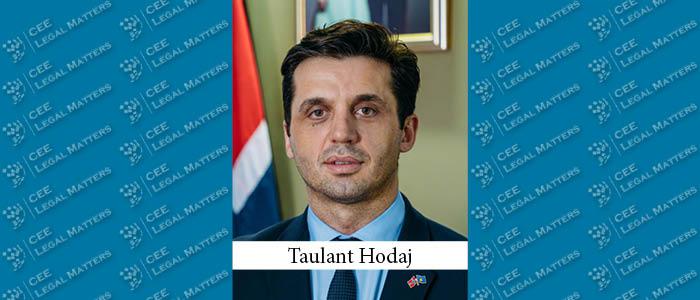Legal changes abound in Kosovo with contested advocacy laws and ongoing judicial reform, says Hodaj & Partners Managing Partner Taulant Hodaj, who highlights that despite challenges, favorable tax laws and investor-friendly policies persist in attracting businesses.
"In Kosovo, we have quite a few legal developments," Hodaj begins. "Among others, there is a notable claim by Kosovo's Bar Association in the Constitutional Court of Kosovo to challenge the advocacy law. The Kosovo Bar Association argues that there are no clear provisions for when lawyers’ licenses are terminated and no legal remedies to challenge decisions."
"We are currently undergoing a judiciary reform," Hodaj continues. "The government has made several attempts to vet judges based on the opinion of the Venice Commission, but these efforts have been challenged in the Constitutional Court. The court has ruled that the laws in question are unconstitutional, and therefore, currently no applicable laws exist." He adds that further changes need to be made through constitutional amendments. "However, these amendments require the approval of two-thirds of the members of parliament to pass, and there is currently no political will to achieve this. As a result, the process of reforming the judiciary and judges vetting is stalled for now."
While on the subject of the judiciary, Hodaj notes that "there is now a fully functional Commercial Court that operates efficiently with more professional judges. Moreover, a new law related to sustainable investments, recently adopted, aligns the country with international standards under the framework of the office of the Prime Minister. This law aims to enhance security for investors in Kosovo by allowing them to bypass the court and negotiate directly with the government, among other provisions. It serves as an additional tool with potential benefits," in assuring investors.
Other laws have been approved, according to Hodaj, "including those addressing corruption and the confiscation of unjustified wealth. These laws impose stricter penalties. Until recently, confiscation wasn't possible, but now the law related to confiscation of unjustified wealth awaits the decision from the Constitutional Court." He adds that "although the constitutional court initially rejected it, the parliament has re-adopted it, and the legal sector is now waiting to see the outcome."
Hodaj also draws attention to a new government-proposed law concerning banks, "which faces opposition from the banking industry and is likely to be challenged in the constitutional court. For consumers, banks currently have the freedom to increase fees and change policies, impacting many people. The government aims to empower the central bank to oversee these changes and implement a final check on fees and other policies, and increase the quality of the operation of the banking system in general in Kosovo."
Hodaj reports the country has a new law on salaries. "This law harmonizes salaries in the public sector, addressing previous discrepancies and challenges, including various claims and concerns," he says. "Prior to this, many different institutions were regulated differently, even when operating at the same level. The law brings more transparency to the public sector."
Ultimately, Hodaj feels out that Kosovo has "an excellent tax law with a low income tax rate and no dividend taxes, making it attractive to start a company in Kosovo. We have a flat profit tax rate of 10%, and taxes include salary and pension contributions. This is beneficial for companies operating in Kosovo, as most of their profit isn't taxed. Many companies are coming here to provide services and implement strategic initiatives. Despite political challenges, we are proud of our flexibility and success in attracting investors, and I don't foresee any changes to this in the near future."

















